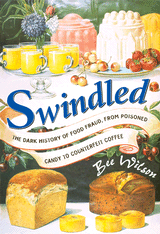
Wilson pays special attention to nineteenth- and twentieth-century America and England and their roles in developing both industrial-scale food adulteration and the scientific ability to combat it. As Swindled reveals, modern science has both helped and hindered food fraudsters--increasing the sophistication of scams but also the means to detect them. The big breakthrough came in Victorian England when a scientist first put food under the microscope and found that much of what was sold as "genuine coffee" was anything but--and that you couldn't buy pure mustard in all of London.
Arguing that industrialization, laissez-faire politics, and globalization have all hurt the quality of food, but also that food swindlers have always been helped by consumer ignorance, Swindled ultimately calls for both governments and individuals to be more vigilant. In fact, Wilson suggests, one of our best protections is simply to reeducate ourselves about the joys of food and cooking.
Powell's Books website states: Linking alchemy, anthropology, politics, and science, Antony Wild uncovers the intrigue that coffee has woven into its 500-year history.
Coffee trader and historian Antony Wild delivers a rollicking history of the most valuable legally traded commodity in the world after oil — and an industry that employs one hundred million people throughout the world.
From obscure beginnings in East Africa in the fifteenth century as a stimulant in religious devotion, coffee became an imperial commodity, produced by poor tropical countries and consumed by rich temperate ones. Through the centuries, the influence of coffee on the rise of capitalism and its institutions has been enormous. Revolutions were once hatched in coffeehouses, commercial alliances forged, secret societies formed, and politics and art endlessly debated.
Today, while coffee chains spread like wildfire, coffee-producing countries are in crisis: with prices at a historic low, they are plagued by unprecedented unemployment, abandoned farms, enforced migration, and massive social disruption.
Bridging the gap between coffee's dismal colonial past and its perilous corporate present, Coffee reveals the shocking exploitation that has always lurked at the heart of the industry.

This article in the New York Post led to my discovery of this upcoming gem: BARBIE and Ken are beloved by millions of children - but the people behind the world's most popular dolls were involved in unsavory sexual behavior they kept secret for years, a new book reveals. In "Toy Monster: The Big, Bad World of Mattel," out next month, Jerry Oppenheimer reveals that Jack Ryan, the Yale-educated designer who popularized Barbie, was a "full-blown seventies-style swinger" with "a manic need for sexual gratification."
Staging orgies at his Bel-Air mansion, Ryan, whose wives included Zsa Zsa Gabor, surrounded himself with busty Barbie clones, including Gwen Florea, who was the "voice of Barbie" in a line of talking dolls. The book quotes her: "He once said to me he loved me being tall so he could stick his nose in my boobs when he hugged me."
Ryan's friend, Stephen Gnass, confides to the author: "When Jack talked about creating Barbie . . . it was like listening to somebody talk about a sexual episode, almost like listening to a sexual pervert . . ." Ryan took calls at Mattel from a madam and patronized "high-class call girls to streetwalkers," including a "very thin and child-like" hooker. The book claims that Ryan "somehow rationalized that he was the only man in her life" until he was diagnosed with gonorrhea.
Barbie and Ken were named after the kids of Mattel founders Ruth and Elliot Handler - an honor that plagued Ken, who "grew up embarrassed and humiliated by having an anatomically incorrect boy doll named after him . . . [with] no hint of genitalia."
Despite marrying and having three kids, Ken was a closeted gay, Oppenheimer says. "To all those who knew him Ken Handler was a wonderful father, a loving husband . . . But there was another side to Ken. And in 1990 he was formally diagnosed with AIDS. His parents and wife were shocked." He died in 1994 in Greenwich Village, but obits didn't mention the disease
There is the nerd coming out in me. =D All three are history... I definitely know I'm buying the Mattel one, but the others are a maybe...




No comments:
Post a Comment